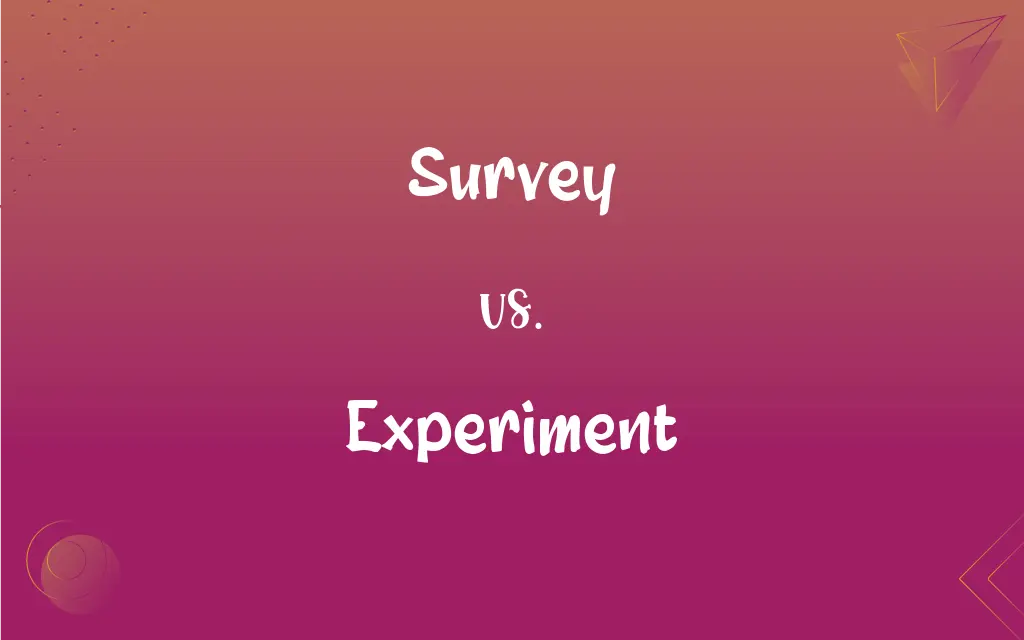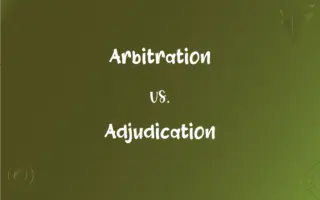Survey vs. Experiment: What's the Difference?
Edited by Aimie Carlson || By Harlon Moss || Published on November 29, 2023
A survey gathers information via questions from a sample; an experiment tests hypotheses through controlled procedures.

Key Differences
A survey is a research method used for collecting data from a predefined group. An experiment is a research method involving controlled variables to test a hypothesis.
Surveys often use questionnaires or interviews to gather opinions or behaviors. Experiments manipulate variables to observe effects and establish cause and effect.
The data from a survey is typically descriptive and used for correlational analysis. In contrast, experimental data allows for testing hypotheses and establishing causality.
Surveys are useful for understanding trends, preferences, or opinions in a population. Experiments are suited for exploring relationships between variables under controlled conditions.
Surveys can be distributed widely and are relatively low cost. Experiments, especially in laboratories, often require detailed planning and can be costlier.
ADVERTISEMENT
Comparison Chart
Purpose
Gathering information from a group
Testing hypotheses under controlled conditions
Method
Questionnaires, interviews
Manipulating and observing variables
Data Type
Descriptive, used for correlation
Causal, used for hypothesis testing
Setting
Can be conducted anywhere
Often in controlled environments
Cost & Complexity
Generally low-cost and straightforward
Can be complex and costly
ADVERTISEMENT
Survey and Experiment Definitions
Survey
Examination or inspection of an area or condition.
The engineer completed a survey of the building's structure.
Experiment
An act or operation for discovering something unknown.
They did an experiment to find the best plant growth conditions.
Survey
A comprehensive overview or review.
The book provides a survey of American history.
Experiment
A procedure to test a hypothesis.
The scientists conducted an experiment to test the new theory.
Survey
A method of gathering information from individuals.
They conducted a survey to understand customer preferences.
Experiment
A practical test of the effects of something.
The experiment tested the effects of sleep on memory.
Survey
Systematic collection of data from a sample population.
The health survey collected data from 1,000 participants.
Experiment
An innovative procedure or attempt.
The chef's new recipe was an interesting culinary experiment.
Survey
Measuring and recording the features of an area.
A land survey was conducted before the construction.
Experiment
A trial or test to prove or disprove something.
The experiment aimed to disprove the old assumption.
Survey
To look over the parts, features, or contents of; view broadly
Surveyed the neighborhood from a rooftop.
Surveyed the shelves in the pantry.
Experiment
A test under controlled conditions that is made to demonstrate a known truth, examine the validity of a hypothesis, or determine the efficacy of something previously untried.
Survey
To look at or examine carefully and appraise
Surveyed the storm damage. ].
Experiment
The process of conducting such a test; experimentation.
FAQs
What is the main goal of a survey?
To gather data or opinions from a group of people.
Can an experiment establish causality?
Yes, experiments can establish cause-and-effect relationships.
Can surveys have open-ended questions?
Yes, surveys can include both open-ended and closed-ended questions.
Is replication important in experiments?
Yes, replicating experiments is crucial for verifying results.
What's a hypothesis in an experiment?
It's a proposed explanation or prediction that can be tested.
Are surveys usually qualitative or quantitative?
Surveys can be both but are often used for quantitative data.
Are surveys prone to bias?
Yes, survey results can be influenced by various types of bias.
Do experiments need a control group?
Often yes, a control group is needed for comparison.
How do variables work in experiments?
Variables are factors that can be controlled, manipulated, or measured.
What's a controlled variable in an experiment?
It's a variable that is kept constant to observe effects on others.
Can surveys be anonymous?
Yes, many surveys are conducted anonymously for privacy.
What are common survey methods?
Online, telephone, and face-to-face are common survey methods.
Can experiments be conducted outside of a lab?
Yes, field experiments are conducted in natural settings.
What's response bias in surveys?
It's when survey respondents give inaccurate answers.
Can surveys predict future trends?
Surveys can provide insights but aren't always predictive.
Can a survey reach a large population?
Yes, surveys can be distributed widely, even globally.
What's a sample in a survey?
It's a subset of the population from which data is collected.
What's an experimental group?
It's the group in an experiment that receives the treatment or variable.
Is consent needed for experiments?
Yes, ethical experiments require informed consent from participants.
Are all experiments scientific?
Most follow scientific methods, but there are informal experiments too.
About Author
Written by
Harlon MossHarlon is a seasoned quality moderator and accomplished content writer for Difference Wiki. An alumnus of the prestigious University of California, he earned his degree in Computer Science. Leveraging his academic background, Harlon brings a meticulous and informed perspective to his work, ensuring content accuracy and excellence.
Edited by
Aimie CarlsonAimie Carlson, holding a master's degree in English literature, is a fervent English language enthusiast. She lends her writing talents to Difference Wiki, a prominent website that specializes in comparisons, offering readers insightful analyses that both captivate and inform.






































































